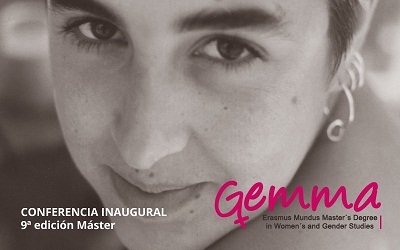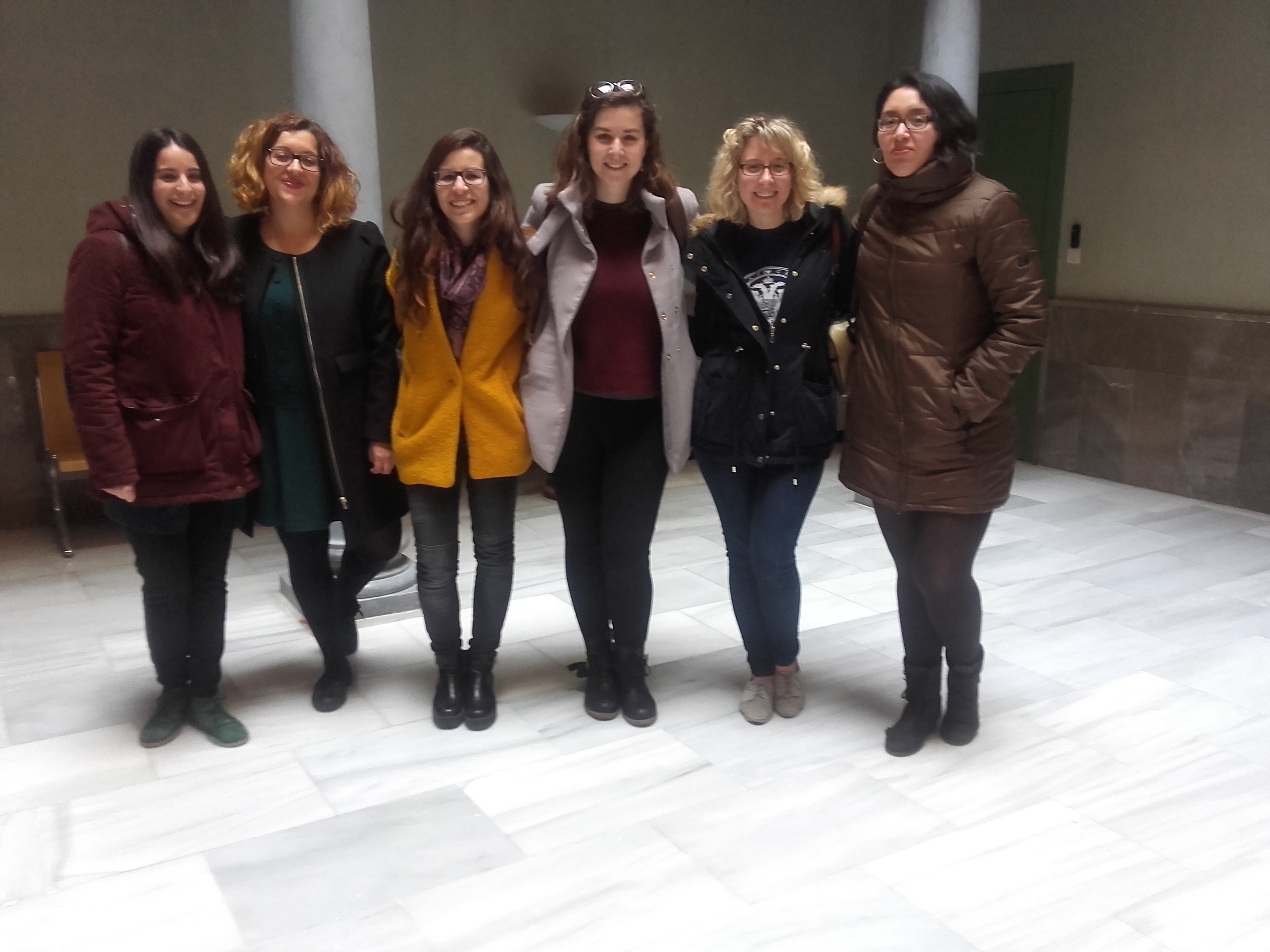September 2015
Welcome Session
On September 22nd, the Official Presentation of the IX Edition of the Master GEMMA was conducted in the Assembly Hall of the Scientific Centre of the University of Granada, along with the participation of mobility students of the IIX Edition and new students of the IX Edition of GEMMA. The panel was chaired by the GEMMA Consortium Coordinator, Adelina Sánchez Espinosa, the GEMMA Academic Coordinator for the University of Granada, Gerardo Rodríguez Salas, and the Director of the University’s Institute of Women’s and Gender Studies, Ana María Muñoz Muñoz.
Invited Scholar
Mercedes Augustín Puerta was the first invited scholar to the IX Edition of the Master GEMMA. She was invited by Professor Victoria Robles to lecture the students, as part of the course Historia del Feminismo: Movimientos de mujeres en el mundo (History of Feminism: women´s movements around the world). Her classes, on September 30th and October 1st, focused on women movements and on a feminist agenda, since the democratic transition until today.
October 2015
Zelda Alice Franceschi works as a researcher and teaches History of Anthropology and Anthropology of the Americas in the University of Bologna, Italy. Since 2004, she has conducted a field work on indigenous communities in the Chaco Province in Argentina. She was invited on October 1st as part of the Medicalization and Suffering: women who use legal and illegal drugs, coordinated by Professor Nuria Romo Avilés, and Feminist Research: Case Studies II, coordinated by Professor Adelina Sánchez. Her main focuses were, gender and health, medicalization processes in current societies, women, illegality, risky behaviors and ways of promoting health in the community.
Professor Monica Szurmuk from the University of Buenos Aires, Argentina, participated as part of the Erasmus Mundus Scholarship for professors. She was invited to lecture as part of the courses, Feminist Research; Case Studies II and Gender, Art and Literature coordinated by Professor Adelina Sánchez. Her classes focused on gender, literature, cultural criticism and history of literature of women in Latin America.
Professor Rosa Cobo Bedía teaches Sociology of Gender in the University of La Coruña. She is the funder, as well as, the first Director of the University’s Interdisciplinary Seminar of Feminist Studies from 2000 to 2003. She has coordinated the Master on gender and equality policies from 2005 until 2008. The Professor’s main research focuses are on feminist theory and gender sociology. One of her latest and most remarkable publication is the book Hacia una nueva política sexual. Las mujeres ante la reacción patriarcal (2011), in which she analyzes the new processes that feed the current patriarchal reaction against women. She was an invited scholar, on the 5th and 6th of October, to the class Teoría feminista: igualdad, diferencia y diversidad (Feminist Theory: equality, difference and diversity), coordinated by Professor Cándida Martínez. She lectured on: -The philosophical feminism of Simone de Beauvoir. The liberal feminism of Betty Friedan. The radical feminism of Kate Millet. –Feminism, multiculturalism and globalization. Neoliberalism and feminization of poverty. Feminism, human development and public policies. Parity democracy and vindication politics.
Lina Gálvez Muñoz was an invited scholar on October 19th and 20th in the class Teoría feminista: igualdad, diferencia y diversidad (Feminist Theory; equality, difference and diversity). She is a Professor of History and Economic Institutions in the Pablo Olavide University of Sevilla. She has a Doctorate Degree from the European University Institute in Florence. From 2007 until 2012, she was Vice Chancellor of the Post-Graduate and Permanent Education in the Pablo Olavide University of Sevilla. Since 2009, she is the Director of the University’s Master in Gender and Equality and since 2010, of the Doctorate Program in Development and Citizenship. The Professor publishes in several prestigious magazines and editorials. The class focused on economy and gender.
Professor Montserrat Cabréi Pairet, from the University of Cantabria was the invited scholar to the Género, cuerpo y mujeres en la historia de Occidente: prácticas de salud y discursos científicos (Gender, body and women in west History: Health practices and scientific discourses), coordinated by Teresa Ortiz and Agata Ignaciuk. Montserrat Cabréi has a Doctorate in Medieval History from the University of Barcelona. She teaches History of Science in the University of Cantabria, in which she introduced and directed the Interdisciplinary Seminar Isabel Torres for Women's and Gender Studies between 2004 and 2010. Since the 1980’s, she is an activist of the movement for the institutionalization of women and gender studies, in which she cooperates with the National and International Professional Associations. She was the Secretary of the Spanish Association of the Research of the History of Women. She was awarded in 2011 with the 1st Equality Award given by the University of Cantabria
Opening Conference
On October 9th the Opening Conference of the 9th Edition of the Master GEMMA took place on the Assembly Hall of the Scientific Centre of the University of Granada. The invited scholar was Amparo Sánchez member of the group Amparanoia. She presented her autobiographic book La Niña y el Lobo. Una historia machista de violencia y superación

Amparo Sánchez was born on Alcalá la Real, (Jaén), Andalucía, Spain. From 1997 until 2008 she was part of the group “Amparanoia”. In 2006 she became a solo artist. In her first book, La Niña y el Lobo, Sánchez tells her story in an effort to give voice and visibility to all women who suffered and still suffer from gender violence. The book, her autobiography, portraits her brutal and hard breaking story about gender violence. Her story is one of personal improvement and overcoming adversities.
December 2015
As part of the courses coordinated by Professor Adelina Sánchez (Gender, Art and Literature and Feminist Research; Case Studies II) GEMMA received the following invited scholars:
Dorota Golańska, works as a professor of the American Studies Department, of the Media Department and Women Studies of the Lodz University in Poland. She was invited to lecture on December 3rd and 4th about Methodology of Writing / Feminist Auto/Biography, Language and Methodology of Writing in Feminist Academic Research. Professor Golańska has a Doctoral Degree on Humanities and a Master in International Relations. She researches on gender, new materialisms, memory and trauma studies. She has, recently, worked with concepts such as technology of visualization, critiques of representation, affective studies, dark tourism, and aesthetics through a feminist approach.
Marek Wojtaszek works as Assistant Professor in the Humanities Department, the American Studies Department and the Media Department of the Faculty of Political and International Studies of the Lodz University in Poland. Professor Wojtaszek was invited to lecture in two sessions about Feminist Politics of Language and Writing. To finish the year, we had the presence of Professor Katherine O´Donnell from the University of Dublin, Ireland. She lectured on December 14th and 15th about: Introduction to Feminist Conceptions of Gender Power: -Oppression and Privilege Dynamic -Gender Theory: Myths of Origin.
María Soledad Morales Ladrón, is an English and Irish Literature Professor on the University of Alcalá de Henares (Madrid). Her main research fields are on contemporary Irish literature and gender studies, correlating literature and psychology. Her publications include the books, Breve introducción a la literature comparada (1999) and Las poéticas de James Joyce y Luis Martín-Santos (2005). The Professor edited the volume Postcolonial and Gender Perspectives in Irish Studies (2007) among other studies on feminist criticism. She lectured the GEMMA students on December 15th.
January 2016
The year started with the presence of Professor Azade Seyhan from Byrn Mawr College of Philadelphia, USA. She was an invited scholar for the classes of Gender, Art and Literature and Feminist Research; Case Studies II, coordinated by Professor Adelina Sánchez. Professor Seyhan is the author of the book Writing Outside the Nation published by Princeton University Press in 2012, and The Translated City: Immigrants, Minorities, Diasporas and Cosmopolitans, published in The Cambridge Companion to the City in Literature by Cambridge University Press in 2014. Texts from Coco Fusco, Yoko Tawada, Gloria Anzaldúa, Ana Castillo, Emine Sevgi Ozdamar, Julia Kristeva, Rosario Ferré, among others were discussed in her class.
Paloma González Marcén works as a Professor in the University of Barcelona. She was an invited scholar to the course, Gender and Archeology, coordinated by Margarita Sánchez. The Professor lectured on January 27th and 28th about Imagining Women of the Past: - Visual representations: between research and ideology - Women of the distant past in art and popular culture and Women’s Heritage and Museums:
- Women in museums or women’s museums?
- Uncovering women’s heritage: a search of new definitions and practices With Professor González´s class, the Mobility semester in the University of Granada concluded.
February 2016
Elena Casado has a PhD in Sociology from the Universidad Complutense de Madrid with an extraordinary award (2002). Her research fields are Sociology and Theory of Comunication, Sociology of Gender Relations and Sociological Theory. She was an invited professor at GEMMA for the module Feminist Methodologies C: Social Sciences and Feminist Criticism. Etnographic methodology and design of social qualitative research projects coordinated by professors Carmen Gregorio and Ana Alcázar. Her classes were on February 2nd, 3rd and 4th and about: -Limitations to tackle gender relations: experiences and references -Technological support (Mediaciones tecnologicas?) in researches: exploring their potentiality -Methodological lab: silences, shames and disgusts in researches on gender relations and sexual bodies.
March 2016
María del Carmen Agulló was an invited scholar in March 10th and 11th to the course Transformaciones socioeducativas en la España del siglo XX: feminismo y propuestas de igualdad, coordinated by professor Victoria Robles Sanjuan. Professor Agulló holds a PhD in Philosophy and Science Education from the University of Valencia (Spain), where she is currently tenured professor and teaches Theory and History of Education. In her GEMMA sessions she looked at the following topics: • The Conquest of Citizenship, the Modern Woman and Educational Advances in the Second Spanish Republic. • Women Role Models in the Spanish Civil War and Feminist Consciousness. • Francoist Spain and the National-Catholic Woman Role Model. Counter-Role Models and Educational Spaces of Women.
Diego Falconi Trávez is a Human Rights Lawyer and has a Bachelor Degree in Liberal Arts. He studied in Quito, Ecuador and Kentucky, USA. He has a PhD in Literature Theory and Compared Literature from the Universitat Autònoma of Barcelona. His thesis was about gay, lesbian and queer narratives in the Andin area. Falconi’s main researches are on literary analysis, discursive and juridical norms, LGBT studies, post and decolonial theories and Andin studies. He has publishes several articles on these subjects in different magazines. He co-edited the volumes, A Body That Could Never Rest (Editorial UOC, 2008) and El cuerpo del significante (Editorial UOC, 2011). Falconi wrote the monographic paper Las entrañas del sujeto jurídico, were he presents a dialogue between literature and law (UOC, 2012). He also translated to Spanish articles from authors such as Shue Mei Shih and Judith Butler. Falconi works as a Professor on the Literature Department of the Universidad Andina Simón Bolivar and as part-time Professor on the Colegio de Jurisprudencia of the San Francisco University of Quito. He is a member of the group “Cuerpo y Textualidad” since 2007. The professor was the first invited scholar to the module, Feminist Research: Cases Studies I, coordinated by the Professors Pilar Villar and Gerardo Rodríguez Salas. He taught two lessons to the students. The first one, on March 31st, was: The relationships between law and literature. The inter-text and the inter-body as tools to rethink gender. The old links have been recovered a few decades ago, and in a schematic and institutional way, by the Law and Literature Studies. This new branch of knowledge, Law and Literature, has launched in Spain and Latin America as an interdisciplinary reflection that unveils shared languages and speeches that mold institutions, traditions and bodies. The second session, on April 1st, focused on inter-text and inter-bodies as cases studies; poetics and politics of resistance. He covered the authors, Juan Gelman (prolific Uruguayan poet) and Pedro Lemebel (Chilean writer and key witness of several crimes perpetuated during the Chilean Dictatorship years, most of them against diverse-sex people who not only suffered from political persecutions but also from gender based discriminations)
April 2016
Celia Prados García was the second invited scholar to lecture on the course Feminist Research: Cases Studies I. She has a Doctorate Degree from the University of Granada. She works for its project “the role of the Law Faculties of the Universities of Andalusia during the Political Transition period (1975-1981)”(El papel de las facultades de derecho de las universidades andaluzas, durante la etapa de la Transición Política (1975-1981)), financed by the Centre of Andalusian Studies. Her main research fields focus on the History of the University and Sephardim migration. She is researcher of the investigation group “Justice and Government in the History of Spanish and European Law” (SEJ463), collaborated in the project “Ethnic groups rights in Colombia: gender, family and land in the Popayán” (PCI – AECID A/024600/09), financed by AECID (may 2009-2010), in the International Workshop of University Research “Holocaust Literature” organized by the CuRe project, “Rewritten bodies: pain and violence in women writers and women’s literature” (P07-HUM-03096) and DiGEC “Discrimination, Genocide and Cultural extermination. Women’s Literature in the Holocaust” (HUM -062). Prados has published in several academic magazines (Revista de Estudios Histórico-Jurídicos, el Anuario de Historia del Derecho y La ciudad blanca. Anuario de la Cátedra Universitaria España-Israel) and contributed in a number of congresses and discussion forums. She lectured the first year GEMMA students on April 6th and on 7th, in which she offered a review of women in the History of Law and a guided visit to the Archivo de la Real Chancillería de Granada.


